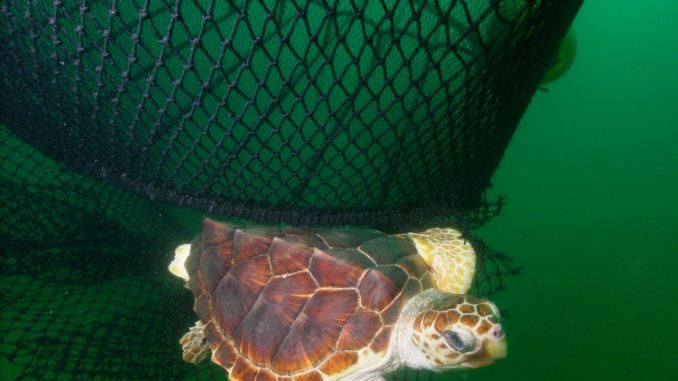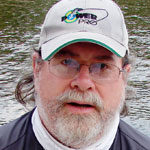
NMFS hasn’t actively enforced rules to help turtles, groups charge
A coalition of conservation groups notified the National Marine Fisheries Service (NMFS) of its intent to file suit over the agency’s failure to prevent the annual capture and drowning of more than 53,000 threatened and endangered sea turtles in the nets of shrimp trawlers operating in the Gulf of Mexico and the south Atlantic.
The Turtle Restoration Network, the Center for Biological Diversity, the Sea Turtle Conservancy and Oceana notified the agency of the suit, which comes two years after the conservation groups settled another suit that sought to address more than 3,500 sea turtles that washed up injured or dead on Gulf coast and Atlantic coast beaches in 2011.
At the time, NMFS linked many of those sea turtle deaths and injuries to capture in shrimp-fishing nets. This litigation was settled when NMFS promised to propose new shrimping regulations to help protect sea turtles. However, instead of implementing more protective fishing gear regulations, NMFS withdrew the proposed rules completely.
The conservation groups charge that NMFS has failed to complete a revised analysis of the impacts of shrimp trawling on sea turtles, even after acknowledging previous analyses were inadequate and did not account for poor compliance with existing regulations.
“We had high hopes that we were moving toward a solution for sea turtles, but once again the Fisheries Service has failed to actually implement the protective measures,” said Jaclyn Lopez, an attorney at the Center for Biological Diversity. “The agency has gotten into a disturbing habit of initiating protections and then stalling them. Every day, protections are delayed is another day that these sea turtles face the very real risk of drowning in shrimp nets.”
Lopez said turtle- excluder devices, known as TEDs, prevent turtles from drowning in nets, but limited use and lax enforcement have led to thousands of sea turtle deaths. Shallow-water shrimp vessels using skimmer trawls aren’t required to use TEDs, and are permitted to simply self-enforce time limits on their tows. Enforcement records show that only 35 percent actually comply with these regulations.
North Carolina is operating under an Incidental Take Permit (ITP) in the gill-net fishery that allows a limited take of sea turtles, which are protected under the Endangered Species Act (ESA). This exemption to the ESA is for the gill-net fishery and does not include shrimp trawls. North Carolina requires the use of TEDs in otter trawls.
“We are aware of this legal action and (are) watching it closely,” said Dr. Louis Daniel, director of the N.C. Division of Marine Fisheries. “It does not initially appear to directly relate to us in state waters but is directed at NMFS, which is responsible for the waters from three to 200 miles offshore. In fact, near the end of the letter notifying NMFS of the intent to sue, there is a section on what actions would be required to prevent the litigation and that only include actions for the Gulf of Mexico. Still, any time you hear these groups citing litigation based on the ESA, you pay attention, because the ramifications may extend farther than even they intended.”
The section of the letter cited by Daniel states, “An appropriate remedy that would prevent litigation would be for the Fisheries Service to suspend the shrimp trawl fishery in the Gulf of Mexico until the completion of consultation and for the State of Louisiana to enforce any measures deemed necessary by the Fisheries Service to protect endangered species from state-authorized shrimp fishing activities.”
Ray Brown, who served on the Shrimp Fishery Management Plan Advisory Committee for the N.C. Marine Fisheries Commission and is actively pursuing reducing the by-catch of juvenile finfish in North Carolina’s inshore shrimp trawl fishery, agrees with Daniel.
“I see this as a NMFS issue and only directly related to shrimping in federal waters,” Brown said. “In North Carolina, we don’t have much shrimping taking place in federal waters, which begin at three miles off the beach. Most of our ocean trawling is closer to the beaches in state waters out to three miles. However, I assure you this litigation is under close scrutiny from all sides.”




Be the first to comment